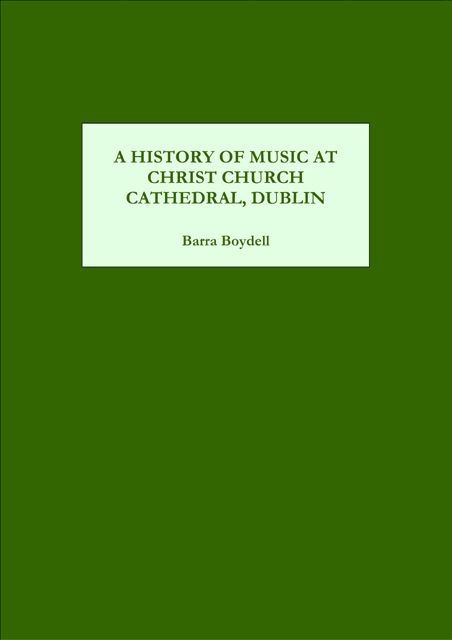Book contents
- Frontmatter
- Contents
- Plates and Musical Examples
- Foreword
- Preface
- Editorial Conventions
- Introduction
- One ‘Dulces Fecit Modos’: The Medieval Cathedral-Priory
- Two ‘For the More Honour of God’s Divine Service’: The Reformation and Early Seventeenth Century
- Three “So Great and Solemn Service’: The Restoration and Later Seventeenth Century
- Four ‘The Increasing Excellence of the Choir’: The Eighteenth and Early Nineteenth Centuries
- Five ‘A More Efficient Performance of the Duties of the Choir’: The Mid-Nineteenth Century
- Six Decline and Revival: Disestablishment and the Twentieth Century
- Appendix One Succession Lists of Organists and Assistant Organists
- Appendix Two Succession List of Masters of the Boys/Music Masters/Choir Masters
- Abbreviations and Bibliography
- Index
Two - ‘For the More Honour of God’s Divine Service’: The Reformation and Early Seventeenth Century
Published online by Cambridge University Press: 21 March 2023
- Frontmatter
- Contents
- Plates and Musical Examples
- Foreword
- Preface
- Editorial Conventions
- Introduction
- One ‘Dulces Fecit Modos’: The Medieval Cathedral-Priory
- Two ‘For the More Honour of God’s Divine Service’: The Reformation and Early Seventeenth Century
- Three “So Great and Solemn Service’: The Restoration and Later Seventeenth Century
- Four ‘The Increasing Excellence of the Choir’: The Eighteenth and Early Nineteenth Centuries
- Five ‘A More Efficient Performance of the Duties of the Choir’: The Mid-Nineteenth Century
- Six Decline and Revival: Disestablishment and the Twentieth Century
- Appendix One Succession Lists of Organists and Assistant Organists
- Appendix Two Succession List of Masters of the Boys/Music Masters/Choir Masters
- Abbreviations and Bibliography
- Index
Summary
The New Foundation
In the autumn of 1537 royal commissioners arrived in Ireland charged by Henry VIII with authority to suppress monastic houses. Archbishop George Browne of Dublin supported reform and may have had a hand in the resignation early in 1537 of William Hassard, prior of Christ Church since 1520. He ordered reference to ‘the bishop of Rome’ to be removed from all liturgical books, this being carried out in the case of the church of St John the Evangelist which was under the cure of Christ Church. The priory of All Hallows, the second Arrouasian house of the Augustinian canons regular in Dublin, was dissolved in autumn 1538 and in the following February the destruction of all shrines and relics was ordered, the jewels and precious metals being sent to the Irish exchequer. The value yielded by Christ Church, £35 15s 6d, was second only to Our Lady’s shrine in Trim and reflected the cathedral’s importance as a centre of pilgrimage. Amongst items lost to Christ Church was the baculus Ihesu, the offerings to which had supported the boys of the choir since 1493. The future for the priory of Holy Trinity at Christ Church must have seemed bleak. In May 1539 the remaining religious houses in Ireland were ordered to be dissolved and by December the commissioners, who had been travelling southwards from Dundalk, reached Dublin. For the first time they encountered popular resistance when they turned their attentions to Christ Church, the mayor and aldermen, supported by the lord deputy and council, protesting to the king’s principal secretary of state that the cathedral, like St Paul’s in London
standith in the middes of the said citie . . . hit is the verie station place, wher as the Kynges Graces honorable Parliamentes and Counsailles ar kepyn, all sermons ar made, and wher as the congregacions of the said citie, in processions and station daies, and at all other tymes necessarie, assemblith, and at all tymes of the birth of our mooste noble Princes and Princesses, and othir tymes of victorie and tryumphe, processions ar made, and ‘Te Deum laudamus’ customabilie is songe, to the laude and praise of God, and the honor of our said Princes and Princesses.
- Type
- Chapter
- Information
- A History of Music at Christ Church Cathedral, Dublin , pp. 32 - 62Publisher: Boydell & BrewerPrint publication year: 2004



